The Cambridge History of China. Vol. 06. Alien Regimes and Border States, 907-1368
Подождите немного. Документ загружается.

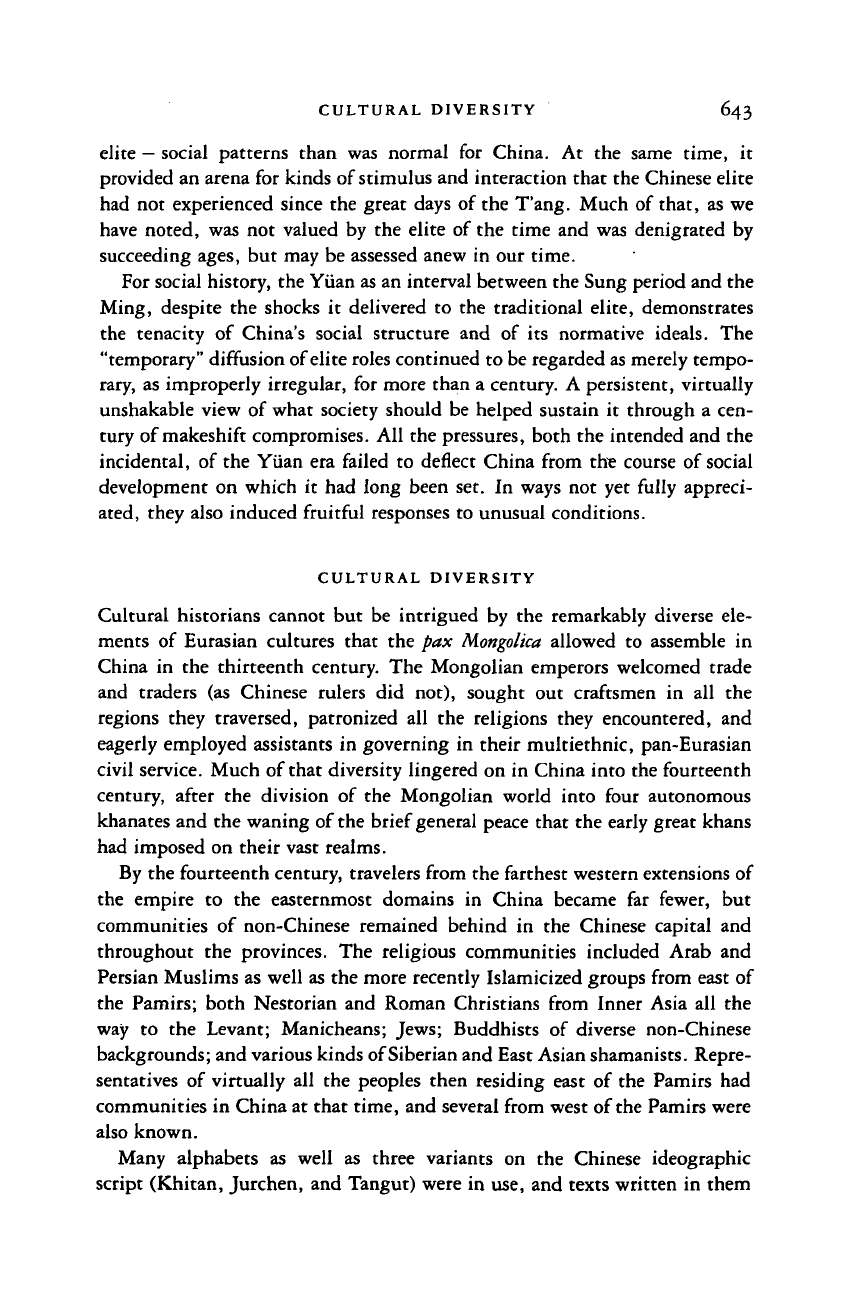
CULTURAL DIVERSITY 643
elite
—
social patterns than was normal for China. At the same time, it
provided an arena for kinds of stimulus and interaction that the Chinese elite
had not experienced since the great days of the T'ang. Much of that, as we
have noted, was not valued by the elite of the time and was denigrated by
succeeding ages, but may be assessed anew in our time.
For social history, the Yuan as an interval between the Sung period and the
Ming, despite the shocks it delivered to the traditional elite, demonstrates
the tenacity of China's social structure and of its normative ideals. The
"temporary" diffusion of elite roles continued to be regarded as merely tempo-
rary, as improperly irregular, for more than a century. A persistent, virtually
unshakable view of what society should be helped sustain it through a cen-
tury of makeshift compromises. All the pressures, both the intended and the
incidental, of the Yuan era failed to deflect China from the course of social
development on which it had long been set. In ways not yet fully appreci-
ated, they also induced fruitful responses to unusual conditions.
CULTURAL DIVERSITY
Cultural historians cannot but be intrigued by the remarkably diverse ele-
ments of Eurasian cultures that the pax Mongolka allowed to assemble in
China in the thirteenth century. The Mongolian emperors welcomed trade
and traders (as Chinese rulers did not), sought out craftsmen in all the
regions they traversed, patronized all the religions they encountered, and
eagerly employed assistants in governing in their multiethnic, pan-Eurasian
civil service. Much of that diversity lingered on in China into the fourteenth
century, after the division of the Mongolian world into four autonomous
khanates and the waning of the brief general peace that the early great khans
had imposed on their vast realms.
By the fourteenth century, travelers from the farthest western extensions of
the empire to the easternmost domains in China became far fewer, but
communities of non-Chinese remained behind in the Chinese capital and
throughout the provinces. The religious communities included Arab and
Persian Muslims as well as the more recently Islamicized groups from east of
the Pamirs; both Nestorian and Roman Christians from Inner Asia all the
way to the Levant; Manicheans; Jews; Buddhists of diverse non-Chinese
backgrounds; and various kinds of Siberian and East Asian shamanists. Repre-
sentatives of virtually all the peoples then residing east of the Pamirs had
communities in China at that time, and several from west of the Pamirs were
also known.
Many alphabets as well as three variants on the Chinese ideographic
script (Khitan, Jurchen, and Tangut) were in use, and texts written in them
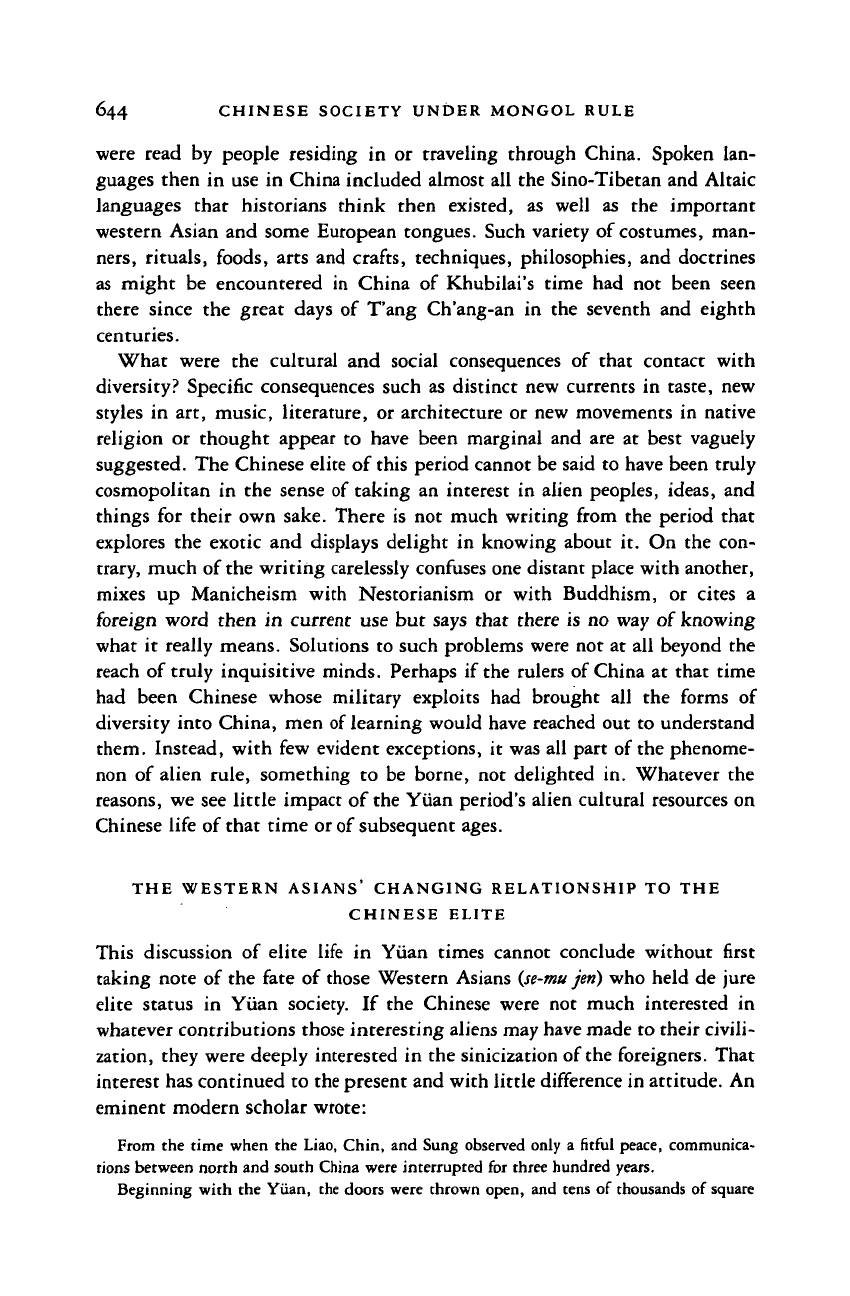
644 CHINESE SOCIETY UNDER MONGOL RULE
were read
by
people residing
in or
traveling through China. Spoken
lan-
guages then
in
use
in
China included almost
all
the Sino-Tibetan and Altaic
languages that historians think then existed,
as
well
as the
important
western Asian
and
some European tongues. Such variety
of
costumes,
man-
ners,
rituals, foods, arts
and
crafts, techniques, philosophies,
and
doctrines
as might
be
encountered
in
China
of
Khubilai's time
had not
been seen
there since
the
great days
of
T'ang Ch'ang-an
in the
seventh
and
eighth
centuries.
What were
the
cultural
and
social consequences
of
that contact with
diversity? Specific consequences such
as
distinct new currents
in
taste,
new
styles
in art,
music, literature,
or
architecture
or
new movements
in
native
religion
or
thought appear
to
have been marginal
and are at
best vaguely
suggested. The Chinese elite
of
this period cannot be said
to
have been truly
cosmopolitan
in the
sense
of
taking
an
interest
in
alien peoples, ideas,
and
things
for
their own sake. There
is not
much writing from
the
period that
explores
the
exotic
and
displays delight
in
knowing about
it. On the con-
trary, much of the writing carelessly confuses one distant place with another,
mixes
up
Manicheism with Nestorianism
or
with Buddhism,
or
cites
a
foreign word then
in
current
use but
says that there
is no
way
of
knowing
what
it
really means. Solutions
to
such problems were
not at all
beyond
the
reach
of
truly inquisitive minds. Perhaps
if
the rulers
of
China
at
that time
had been Chinese whose military exploits
had
brought
all the
forms
of
diversity into China, men of learning would have reached
out to
understand
them. Instead, with
few
evident exceptions,
it
was
all
part
of
the phenome-
non
of
alien rule, something
to be
borne,
not
delighted
in.
Whatever
the
reasons, we see little impact
of
the Yuan period's alien cultural resources
on
Chinese life
of
that time or
of
subsequent ages.
THE WESTERN ASIANS' CHANGING RELATIONSHIP TO THE
CHINESE ELITE
This discussion
of
elite life
in
Yuan times cannot conclude without first
taking note
of
the fate
of
those Western Asians
(se-mu jen)
who held
de
jure
elite status
in
Yuan society.
If the
Chinese were
not
much interested
in
whatever contributions those interesting aliens may have made to their civili-
zation, they were deeply interested
in
the sinicization of the foreigners. That
interest has continued
to
the present and with little difference in attitude.
An
eminent modern scholar wrote:
From
the
time when
the
Liao, Chin,
and
Sung observed only
a
fitful peace, communica-
tions between north and south China were interrupted
for
three hundred years.
Beginning with
the
Yuan,
the
doors were thrown open,
and
tens
of
thousands
of
square
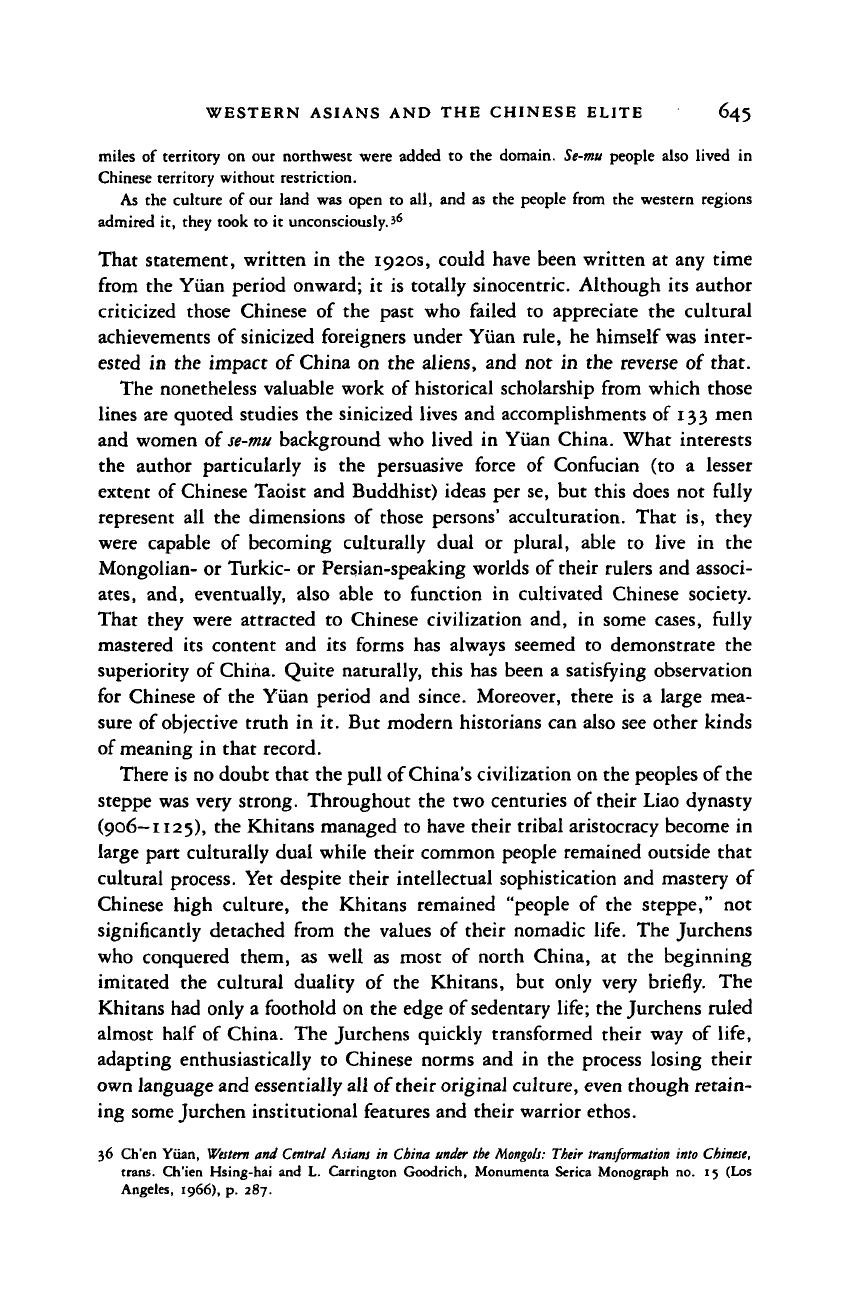
WESTERN ASIANS AND THE CHINESE ELITE 645
miles of territory on our northwest were added to the domain. Se-mu people also lived in
Chinese territory without restriction.
As the culture of our land was open to all, and as the people from the western regions
admired it, they took to it unconsciously.
36
That statement, written in the 1920s, could have been written at any time
from the Yuan period onward; it is totally sinocentric. Although its author
criticized those Chinese of the past who failed to appreciate the cultural
achievements of sinicized foreigners under Yuan rule, he himself was inter-
ested in the impact of China on the aliens, and not in the reverse of that.
The nonetheless valuable work of historical scholarship from which those
lines are quoted studies the sinicized lives and accomplishments of 133 men
and women of
se-mu
background who lived in Yuan China. What interests
the author particularly is the persuasive force of Confucian (to a lesser
extent of Chinese Taoist and Buddhist) ideas per se, but this does not fully
represent all the dimensions of those persons' acculturation. That is, they
were capable of becoming culturally dual or plural, able to live in the
Mongolian- or Turkic- or Persian-speaking worlds of their rulers and associ-
ates,
and, eventually, also able to function in cultivated Chinese society.
That they were attracted to Chinese civilization and, in some cases, fully
mastered its content and its forms has always seemed to demonstrate the
superiority of China. Quite naturally, this has been a satisfying observation
for Chinese of the Yuan period and since. Moreover, there is a large mea-
sure of objective truth in it. But modern historians can also see other kinds
of meaning in that record.
There is no doubt that the pull of China's civilization on the peoples of the
steppe was very strong. Throughout the two centuries of their Liao dynasty
(906-1125), the Khitans managed to have their tribal aristocracy become in
large part culturally dual while their common people remained outside that
cultural process. Yet despite their intellectual sophistication and mastery of
Chinese high culture, the Khitans remained "people of the steppe," not
significantly detached from the values of their nomadic life. The Jurchens
who conquered them, as well as most of north China, at the beginning
imitated the cultural duality of the Khitans, but only very briefly. The
Khitans had only a foothold on the edge of sedentary life; the Jurchens ruled
almost half of China. The Jurchens quickly transformed their way of life,
adapting enthusiastically to Chinese norms and in the process losing their
own language and essentially all of their original culture, even though retain-
ing some Jurchen institutional features and their warrior ethos.
36 Ch'en Yuan,
Western
and Central Asians in China under the
Mongols:
Their
transformation
into Chinese,
trans.
Ch'ien Hsing-hai and L. Carrington Goodrich, Monumenca Scrica Monograph no. 15 (Los
Angeles, 1966), p. 287.
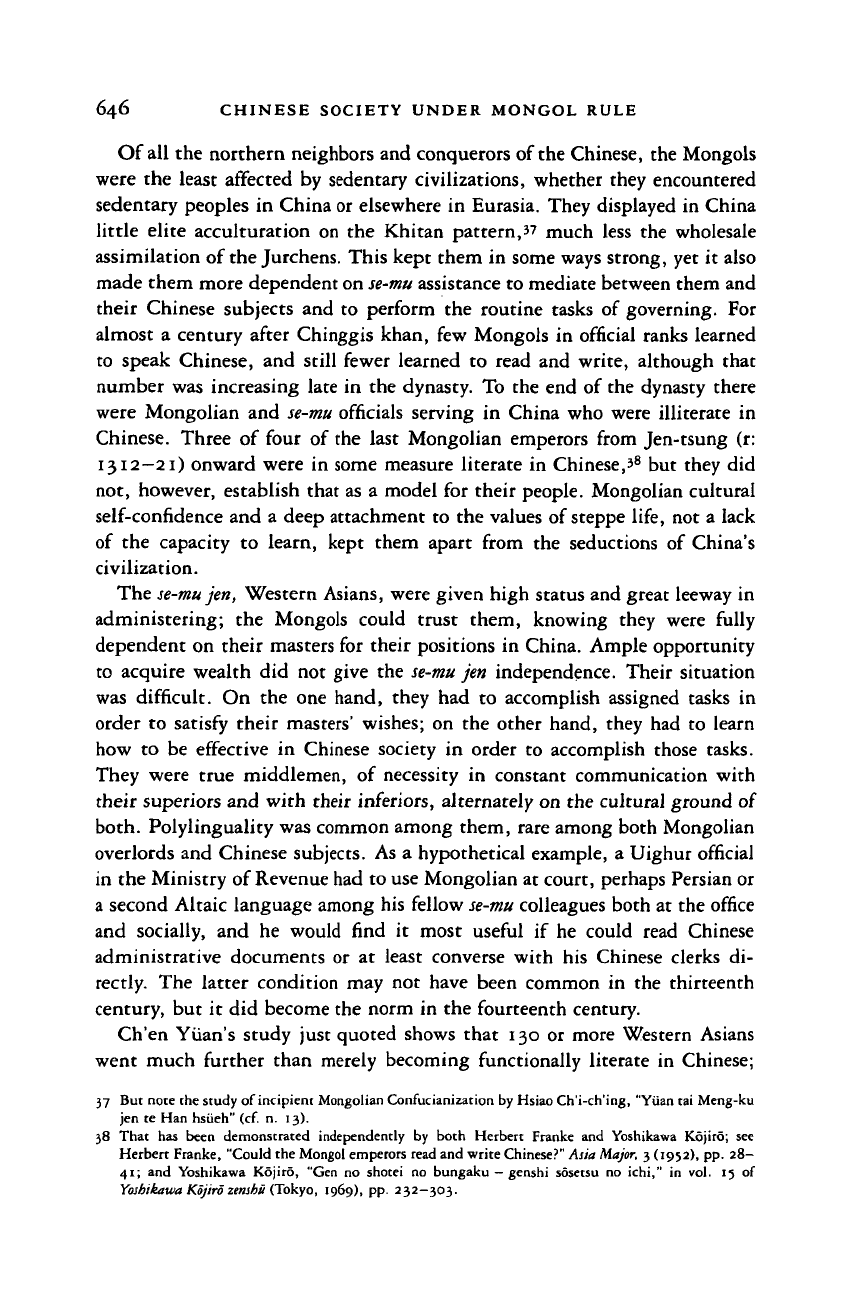
646 CHINESE SOCIETY UNDER MONGOL RULE
Of all the northern neighbors and conquerors of
the
Chinese, the Mongols
were the least affected by sedentary civilizations, whether they encountered
sedentary peoples in China or elsewhere
in
Eurasia. They displayed in China
little elite acculturation on the Khitan pattern," much less
the
wholesale
assimilation of the
Jurchens.
This kept them in some ways strong, yet
it
also
made them more dependent on
se-mu
assistance to mediate between them and
their Chinese subjects and
to
perform
the
routine tasks
of
governing.
For
almost
a
century after Chinggis khan, few Mongols
in
official ranks learned
to speak Chinese, and still fewer learned
to
read and write, although that
number was increasing late
in
the dynasty. To the end of the dynasty there
were Mongolian and
se-mu
officials serving
in
China who were illiterate
in
Chinese. Three
of
four
of
the last Mongolian emperors from Jen-tsung
(r:
1312-21) onward were in some measure literate
in
Chinese,'
8
but they did
not, however, establish that as
a
model for their people. Mongolian cultural
self-confidence and
a
deep attachment
to
the values of steppe life, not
a
lack
of the capacity
to
learn, kept them apart from
the
seductions
of
China's
civilization.
The
se-mu
jen,
Western Asians, were given high status and great leeway in
administering;
the
Mongols could trust them, knowing they were fully
dependent on their masters for their positions in China. Ample opportunity
to acquire wealth
did
not give the
se-mu
jen independence. Their situation
was difficult.
On the
one hand, they had
to
accomplish assigned tasks
in
order
to
satisfy their masters' wishes;
on
the other hand, they had
to
learn
how
to be
effective
in
Chinese society
in
order
to
accomplish those tasks.
They were true middlemen,
of
necessity
in
constant communication with
their superiors and with their inferiors, alternately on the cultural ground of
both. Polylinguality was common among them, rare among both Mongolian
overlords and Chinese subjects. As
a
hypothetical example, a Uighur official
in the Ministry of Revenue had to use Mongolian at court, perhaps Persian or
a second Altaic language among his fellow
se-mu
colleagues both at the office
and socially,
and he
would find
it
most useful
if
he could read Chinese
administrative documents
or at
least converse with
his
Chinese clerks
di-
rectly. The latter condition may
not
have been common
in the
thirteenth
century, but
it
did become the norm
in
the fourteenth century.
Ch'en Yiian's study just quoted shows that 130
or
more Western Asians
went much further than merely becoming functionally literate
in
Chinese;
37 But note the study of incipient Mongolian Confucianization by Hsiao Ch'i-ch'ing, "Yuan tai Meng-ku
jen
te
Han hsiieh"
(cf. n. 13).
38 That
has
been demonstrated independently
by
both Herbert Franke
and
Yoshikawa Kojiro;
see
Herbert Franke, "Could the Mongol emperors read and write Chinese?" Asia Major, 3 (1952), pp.
28-
41;
and
Yoshikawa Kojiro, "Gen
no
shotei
no
bungaku
—
genshi sosetsu
no
ichi,"
in vol. 15 of
Yoshikawa Kojiro
zenshu
(Tokyo, 1969), pp. 232—303.
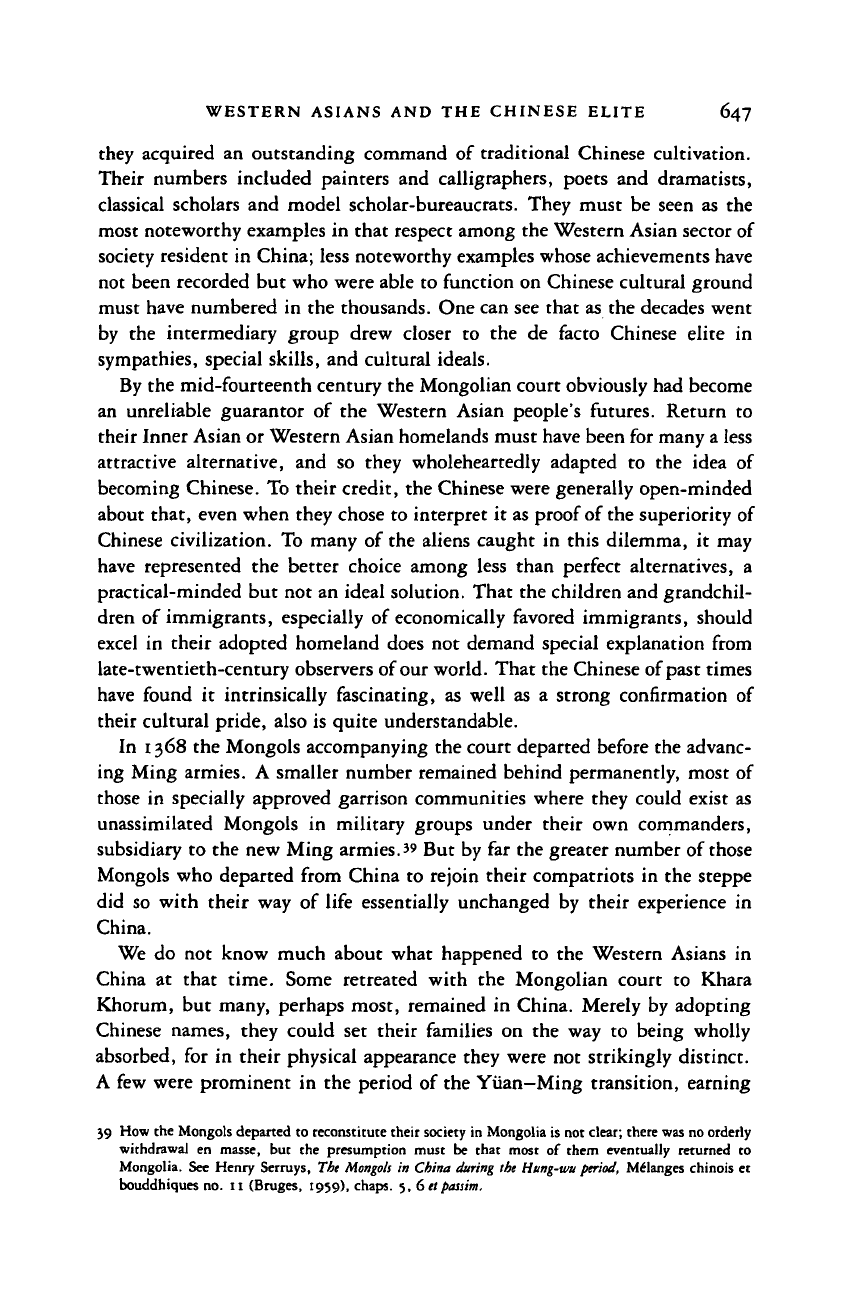
WESTERN ASIANS AND THE CHINESE ELITE 647
they acquired an outstanding command of traditional Chinese cultivation.
Their numbers included painters and calligraphers, poets and dramatists,
classical scholars and model scholar-bureaucrats. They must be seen as the
most noteworthy examples in that respect among the Western Asian sector of
society resident in China; less noteworthy examples whose achievements have
not been recorded but who were able to function on Chinese cultural ground
must have numbered in the thousands. One can see that as the decades went
by the intermediary group drew closer to the de facto Chinese elite in
sympathies, special skills, and cultural ideals.
By the mid-fourteenth century the Mongolian court obviously had become
an unreliable guarantor of the Western Asian people's futures. Return to
their Inner Asian or Western Asian homelands must have been for many a less
attractive alternative, and so they wholeheartedly adapted to the idea of
becoming Chinese. To their credit, the Chinese were generally open-minded
about that, even when they chose to interpret it as proof of the superiority of
Chinese civilization. To many of the aliens caught in this dilemma, it may
have represented the better choice among less than perfect alternatives, a
practical-minded but not an ideal solution. That the children and grandchil-
dren of immigrants, especially of economically favored immigrants, should
excel in their adopted homeland does not demand special explanation from
late-twentieth-century observers of our world. That the Chinese of past times
have found it intrinsically fascinating, as well as a strong confirmation of
their cultural pride, also is quite understandable.
In 1368 the Mongols accompanying the court departed before the advanc-
ing Ming armies. A smaller number remained behind permanently, most of
those in specially approved garrison communities where they could exist as
unassimilated Mongols in military groups under their own commanders,
subsidiary to the new Ming armies.
39
But by far the greater number of those
Mongols who departed from China to rejoin their compatriots in the steppe
did so with their way of life essentially unchanged by their experience in
China.
We do not know much about what happened to the Western Asians in
China at that time. Some retreated with the Mongolian court to Khara
Khorum, but many, perhaps most, remained in China. Merely by adopting
Chinese names, they could set their families on the way to being wholly
absorbed, for in their physical appearance they were not strikingly distinct.
A few were prominent in the period of the Yuan-Ming transition, earning
39 How the Mongols departed to reconstitute their society in Mongolia is not clear; there was no orderly
withdrawal en masse, but the presumption must be that most of them eventually returned to
Mongolia. See Henry Serruys, The Mongols in China during the Hung-wu period, Melanges chinois et
bouddhiques no. 11 (Bruges, 1959), chaps. 5, 6 et passim.
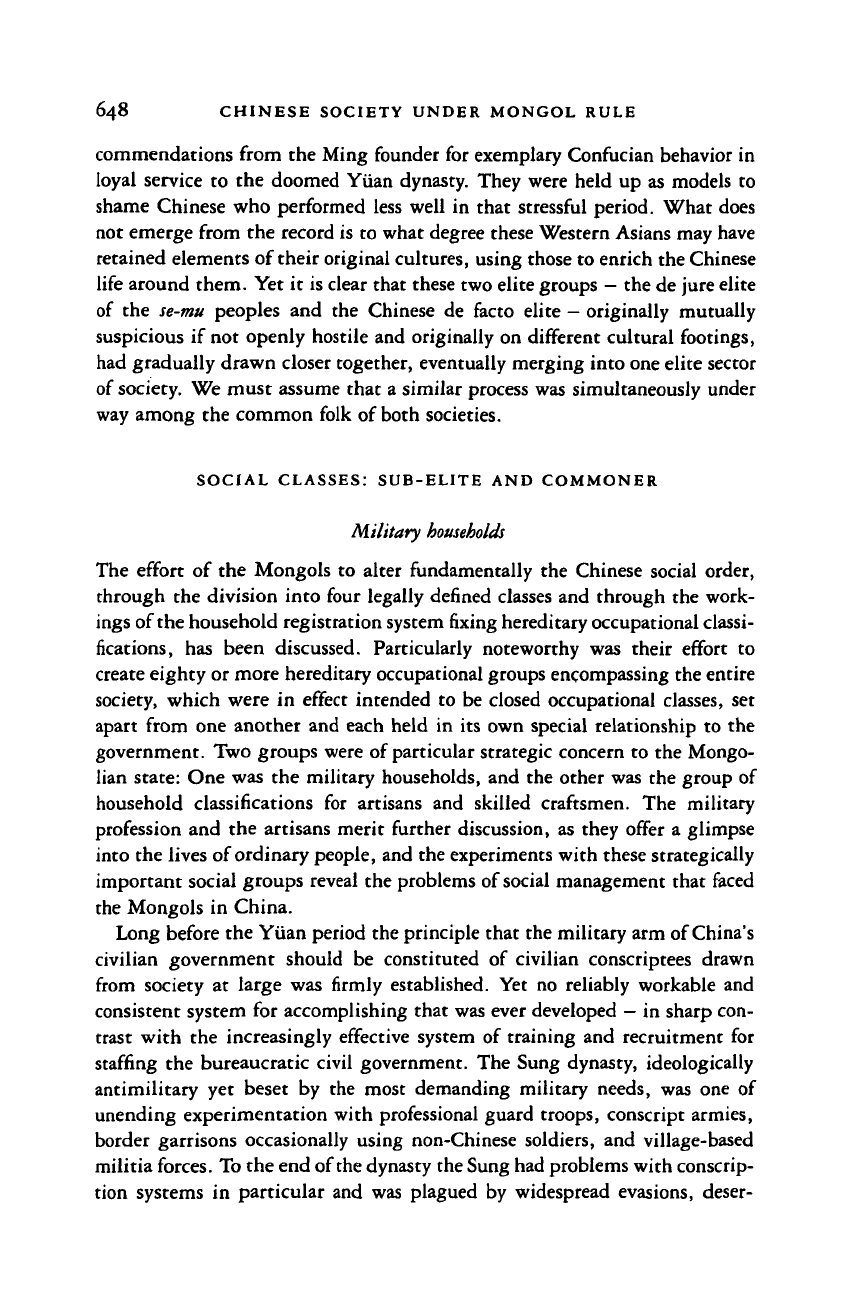
648 CHINESE SOCIETY UNDER MONGOL RULE
commendations from the Ming founder for exemplary Confucian behavior in
loyal service to the doomed Yuan dynasty. They were held up as models to
shame Chinese who performed less well in that stressful period. What does
not emerge from the record is to what degree these Western Asians may have
retained elements of their original cultures, using those to enrich the Chinese
life around them. Yet it is clear that these two elite groups - the de jure elite
of the
se-mu
peoples and the Chinese de facto elite - originally mutually
suspicious if not openly hostile and originally on different cultural footings,
had gradually drawn closer together, eventually merging into one elite sector
of society. We must assume that a similar process was simultaneously under
way among the common folk of both societies.
SOCIAL CLASSES: SUB-ELITE AND COMMONER
Military
households
The effort of the Mongols to alter fundamentally the Chinese social order,
through the division into four legally denned classes and through the work-
ings of the household registration system fixing hereditary occupational classi-
fications, has been discussed. Particularly noteworthy was their effort to
create eighty or more hereditary occupational groups encompassing the entire
society, which were in effect intended to be closed occupational classes, set
apart from one another and each held in its own special relationship to the
government. Two groups were of particular strategic concern to the Mongo-
lian state: One was the military households, and the other was the group of
household classifications for artisans and skilled craftsmen. The military
profession and the artisans merit further discussion, as they offer a glimpse
into the lives of ordinary people, and the experiments with these strategically
important social groups reveal the problems of
social
management that faced
the Mongols in China.
Long before the Yuan period the principle that the military arm of China's
civilian government should be constituted of civilian conscriptees drawn
from society at large was firmly established. Yet no reliably workable and
consistent system for accomplishing that was ever developed
—
in sharp con-
trast with the increasingly effective system of training and recruitment for
staffing the bureaucratic civil government. The Sung dynasty, ideologically
antimilitary yet beset by the most demanding military needs, was one of
unending experimentation with professional guard troops, conscript armies,
border garrisons occasionally using non-Chinese soldiers, and village-based
militia forces. To the end of the dynasty the Sung had problems with conscrip-
tion systems in particular and was plagued by widespread evasions, deser-
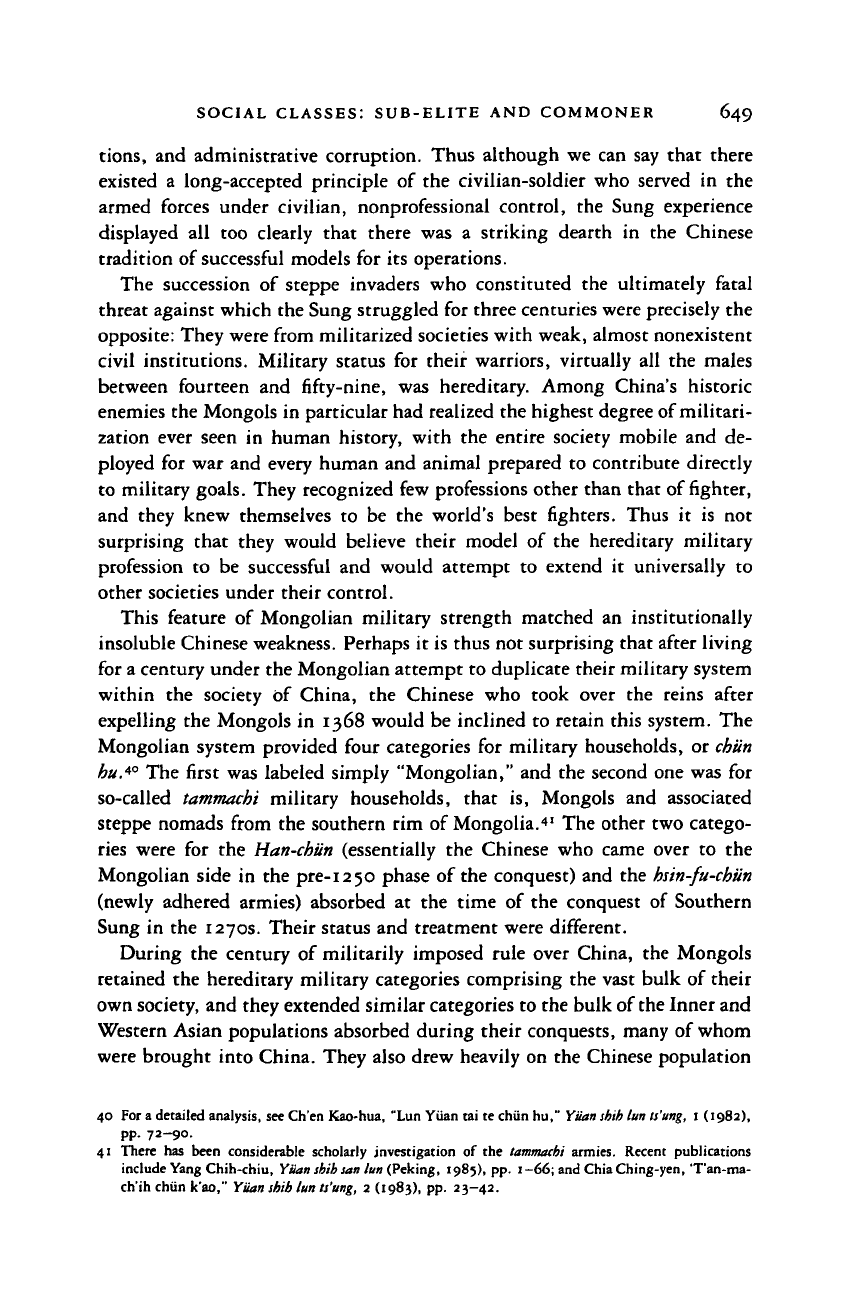
SOCIAL CLASSES: SUB-ELITE AND COMMONER 649
tions,
and administrative corruption. Thus although we can say that there
existed a long-accepted principle of the civilian-soldier who served in the
armed forces under civilian, nonprofessional control, the Sung experience
displayed all too clearly that there was a striking dearth in the Chinese
tradition of successful models for its operations.
The succession of steppe invaders who constituted the ultimately fatal
threat against which the Sung struggled for three centuries were precisely the
opposite: They were from militarized societies with weak, almost nonexistent
civil institutions. Military status for their warriors, virtually all the males
between fourteen and fifty-nine, was hereditary. Among China's historic
enemies the Mongols in particular had realized the highest degree of militari-
zation ever seen in human history, with the entire society mobile and de-
ployed for war and every human and animal prepared to contribute directly
to military goals. They recognized few professions other than that of fighter,
and they knew themselves to be the world's best fighters. Thus it is not
surprising that they would believe their model of the hereditary military
profession to be successful and would attempt to extend it universally to
other societies under their control.
This feature of Mongolian military strength matched an institutionally
insoluble Chinese weakness. Perhaps it is thus not surprising that after living
for a century under the Mongolian attempt to duplicate their military system
within the society of China, the Chinese who took over the reins after
expelling the Mongols in 1368 would be inclined to retain this system. The
Mongolian system provided four categories for military households, or
chun
hu.*°
The first was labeled simply "Mongolian," and the second one was for
so-called
tammachi
military households, that is, Mongols and associated
steppe nomads from the southern rim of Mongolia.
41
The other two catego-
ries were for the
Han-chun
(essentially the Chinese who came over to the
Mongolian side in the pre-1250 phase of the conquest) and the
hsin-fu-chun
(newly adhered armies) absorbed at the time of the conquest of Southern
Sung in the 1270s. Their status and treatment were different.
During the century of militarily imposed rule over China, the Mongols
retained the hereditary military categories comprising the vast bulk of their
own society, and they extended similar categories to the bulk of
the
Inner and
Western Asian populations absorbed during their conquests, many of whom
were brought into China. They also drew heavily on the Chinese population
40 For a detailed analysis, see Ch'en Kao-hua, "Lun Yuan tai te chun hu," Yuan shih lun
u'ung,
I (1982),
pp.
72-90-
41 There has been considerable scholarly investigation of the tammacbi armies. Recent publications
include Yang Chih-chiu, Yuan ihih san lun (Peking, 1985), pp. 1-66; and Chia Ching-yen, Tan-ma-
ch'ih chiin k'ao," Yuan ihib lun ti'ung, 2 (1983), pp. 23—42.
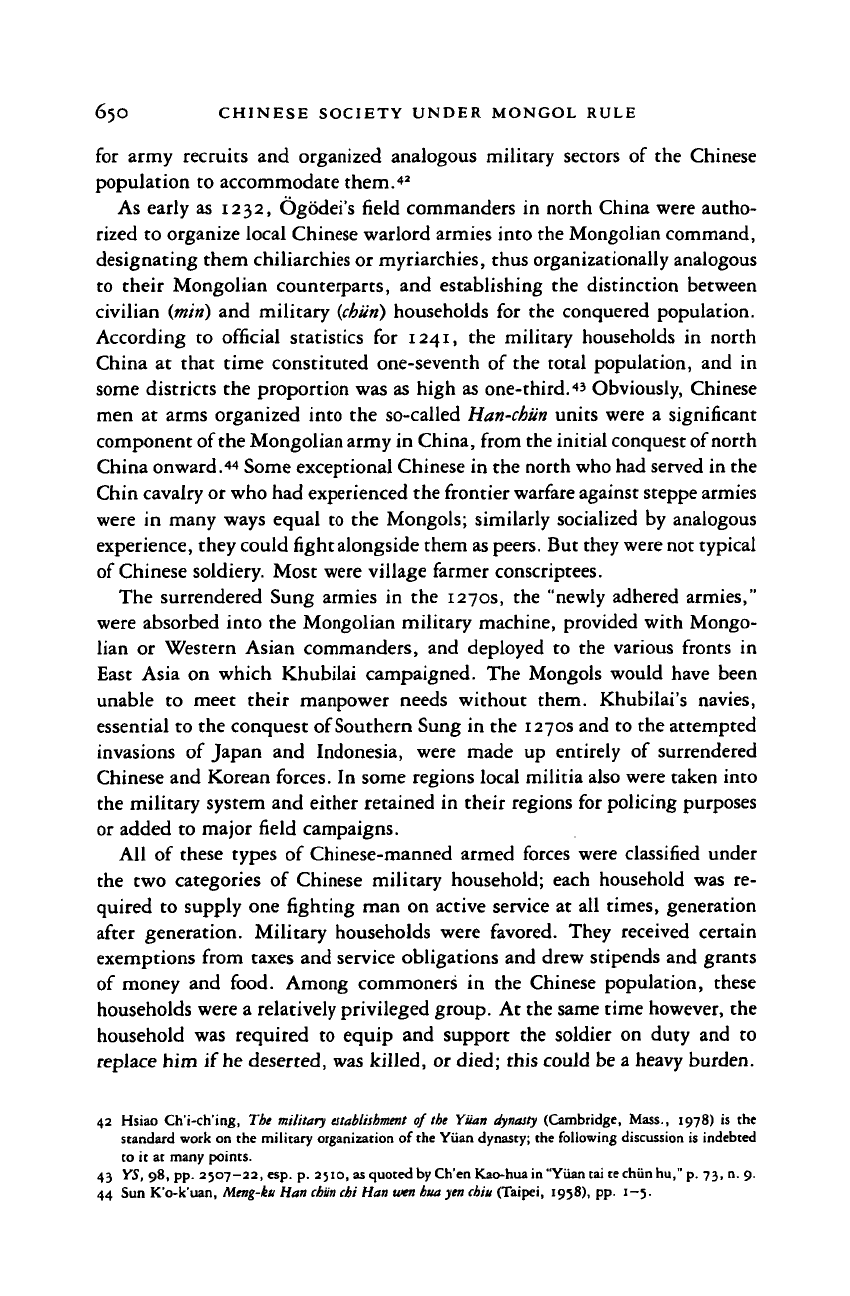
65O CHINESE SOCIETY UNDER MONGOL RULE
for army recruits and organized analogous military sectors of the Chinese
population to accommodate them.
42
As early as 1232, Ogodei's field commanders in north China were autho-
rized to organize local Chinese warlord armies into the Mongolian command,
designating them chiliarchies or myriarchies, thus organizationally analogous
to their Mongolian counterparts, and establishing the distinction between
civilian
(min)
and military
(chiiri)
households for the conquered population.
According to official statistics for 1241, the military households in north
China at that time constituted one-seventh of the total population, and in
some districts the proportion was as high as one-third.
43
Obviously, Chinese
men at arms organized into the so-called
Han-chun
units were a significant
component of the Mongolian army in China, from the initial conquest of north
China onward.
44
Some exceptional Chinese in the north who had served in the
Chin cavalry or who had experienced the frontier warfare against steppe armies
were in many ways equal to the Mongols; similarly socialized by analogous
experience, they could fight alongside them
as
peers.
But they were not typical
of Chinese soldiery. Most were village farmer conscriptees.
The surrendered Sung armies in the 1270s, the "newly adhered armies,"
were absorbed into the Mongolian military machine, provided with Mongo-
lian or Western Asian commanders, and deployed to the various fronts in
East Asia on which Khubilai campaigned. The Mongols would have been
unable to meet their manpower needs without them. Khubilai's navies,
essential to the conquest of Southern Sung in the 1270s and to the attempted
invasions of Japan and Indonesia, were made up entirely of surrendered
Chinese and Korean forces. In some regions local militia also were taken into
the military system and either retained in their regions for policing purposes
or added to major field campaigns.
All of these types of Chinese-manned armed forces were classified under
the two categories of Chinese military household; each household was re-
quired to supply one fighting man on active service at all times, generation
after generation. Military households were favored. They received certain
exemptions from taxes and service obligations and drew stipends and grants
of money and food. Among commoners in the Chinese population, these
households were a relatively privileged group. At the same time however, the
household was required to equip and support the soldier on duty and to
replace him if he deserted, was killed, or died; this could be a heavy burden.
42 Hsiao Ch'i-ch'ing, The military establishment of the Yuan dynasty (Cambridge, Mass., 1978) is the
standard work on the military organization of the Yuan dynasty; the following discussion is indebted
to it at many points.
43 YS, 98, pp. 2507-22, esp. p. 2510, as quoted by Ch'en Kao-hua in "Yuan tai techiinhu,"p. 73, n. 9.
44 Sun K'o-k'uan, Meng-ku Han chin chi Han wen hua yen chiu (Taipei, 1958), pp. 1—5.
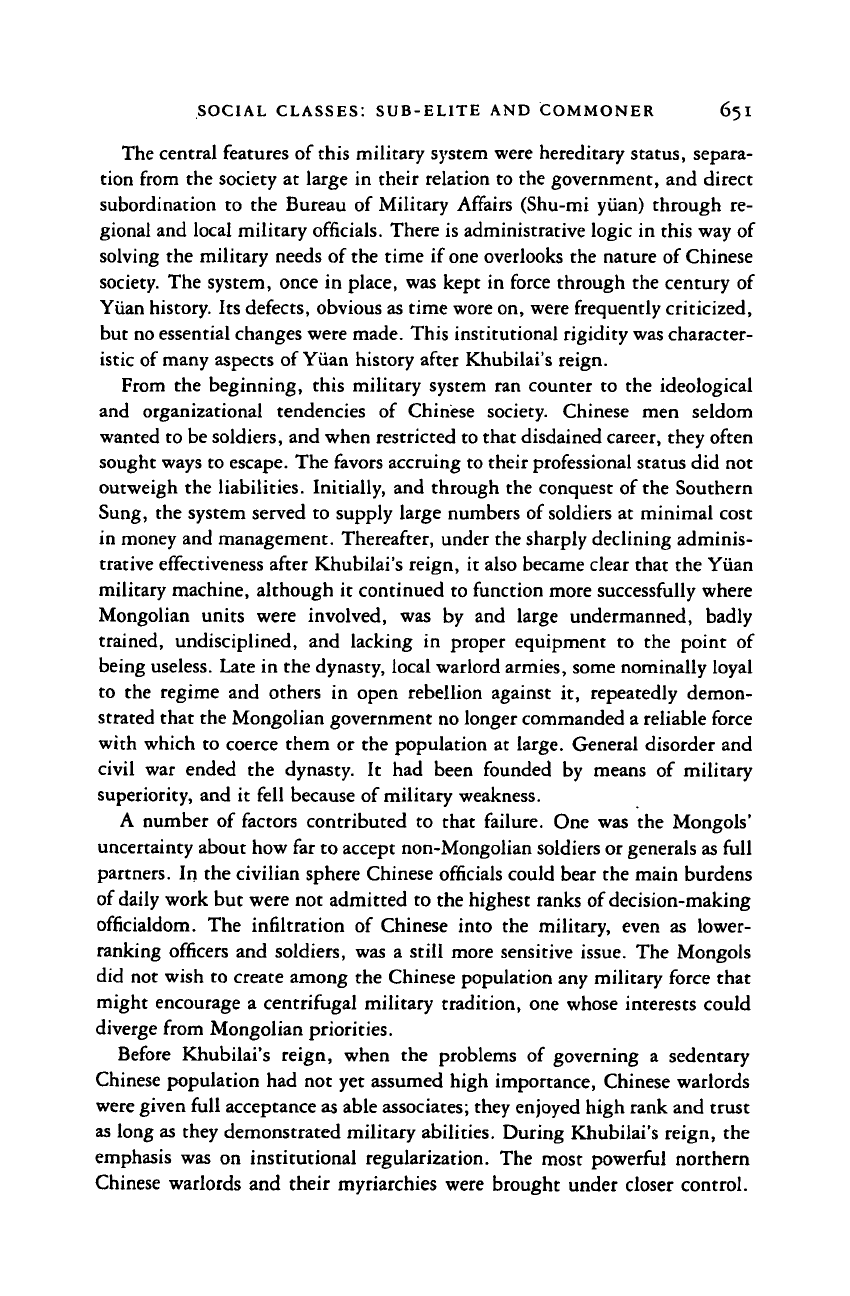
SOCIAL CLASSES: SUB-ELITE AND COMMONER 651
The central features of this military system were hereditary status, separa-
tion from the society at large in their relation to the government, and direct
subordination to the Bureau of Military Affairs (Shu-mi yuan) through re-
gional and local military officials. There is administrative logic in this way of
solving the military needs of the time if
one
overlooks the nature of Chinese
society. The system, once in place, was kept in force through the century of
Yuan history. Its defects, obvious as time wore on, were frequently criticized,
but no essential changes were made. This institutional rigidity was character-
istic of many aspects of Yuan history after Khubilai's reign.
From the beginning, this military system ran counter to the ideological
and organizational tendencies of Chinese society. Chinese men seldom
wanted to be soldiers, and when restricted to that disdained career, they often
sought ways to escape. The favors accruing to their professional status did not
outweigh the liabilities. Initially, and through the conquest of the Southern
Sung, the system served to supply large numbers of soldiers at minimal cost
in money and management. Thereafter, under the sharply declining adminis-
trative effectiveness after Khubilai's reign, it also became clear that the Yuan
military machine, although it continued to function more successfully where
Mongolian units were involved, was by and large undermanned, badly
trained, undisciplined, and lacking in proper equipment to the point of
being useless. Late in the dynasty, local warlord armies, some nominally loyal
to the regime and others in open rebellion against it, repeatedly demon-
strated that the Mongolian government no longer commanded a reliable force
with which to coerce them or the population at large. General disorder and
civil war ended the dynasty. It had been founded by means of military
superiority, and it fell because of military weakness.
A number of factors contributed to that failure. One was the Mongols'
uncertainty about how far to accept non-Mongolian soldiers or generals as full
partners. In the civilian sphere Chinese officials could bear the main burdens
of daily work but were not admitted to the highest ranks of decision-making
officialdom. The infiltration of Chinese into the military, even as lower-
ranking officers and soldiers, was a still more sensitive issue. The Mongols
did not wish to create among the Chinese population any military force that
might encourage a centrifugal military tradition, one whose interests could
diverge from Mongolian priorities.
Before Khubilai's reign, when the problems of governing a sedentary
Chinese population had not yet assumed high importance, Chinese warlords
were given full acceptance as able associates; they enjoyed high rank and trust
as long as they demonstrated military abilities. During Khubilai's reign, the
emphasis was on institutional regularization. The most powerful northern
Chinese warlords and their myriarchies were brought under closer control.
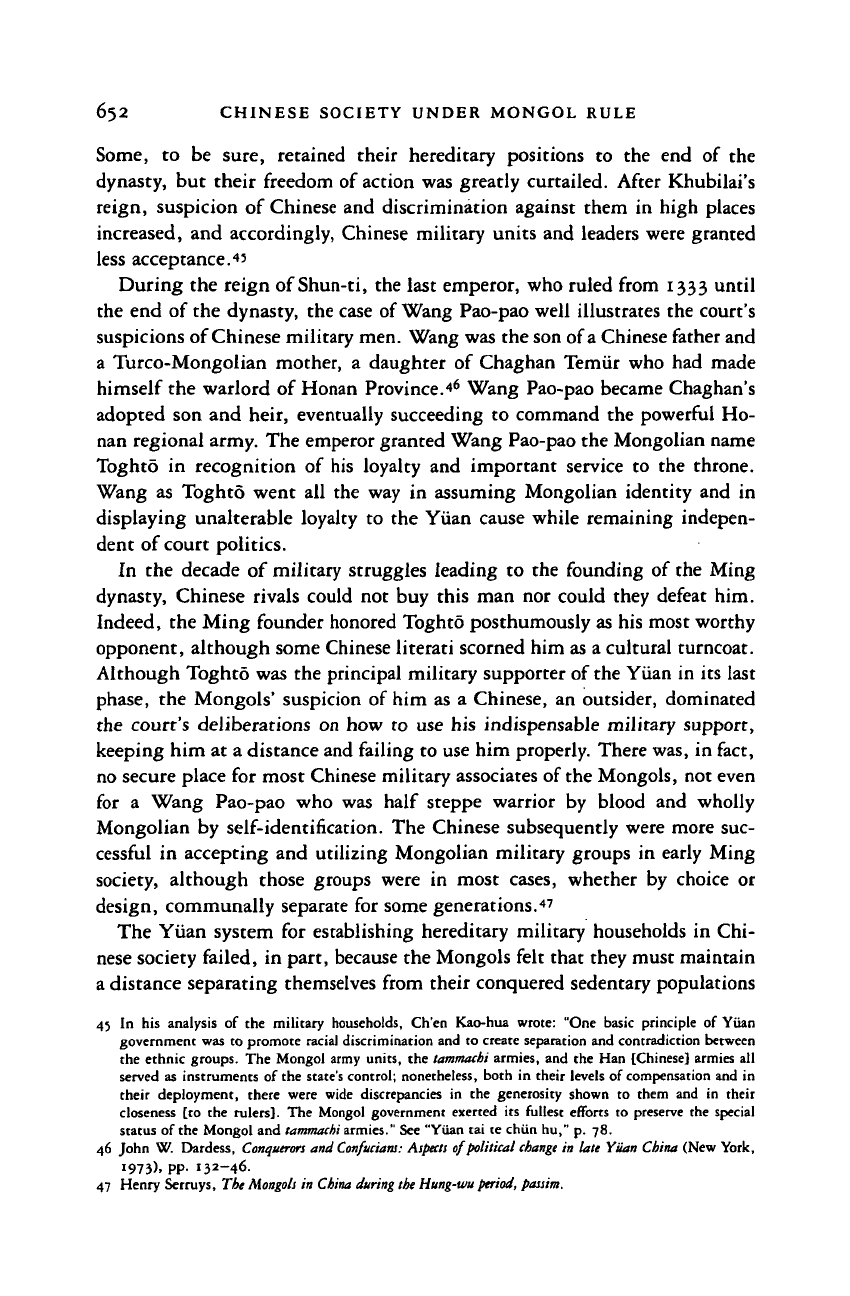
652 CHINESE SOCIETY UNDER MONGOL RULE
Some,
to be
sure, retained their hereditary positions
to the end of the
dynasty,
but
their freedom
of
action was greatly curtailed. After Khubilai's
reign, suspicion
of
Chinese
and
discrimination against them
in
high places
increased,
and
accordingly, Chinese military units and leaders were granted
less acceptance.
1
"
During
the
reign of
Shun-ti,
the last emperor, who ruled from 1333 until
the end
of
the dynasty, the case of Wang Pao-pao well illustrates the court's
suspicions of Chinese military men. Wang was the son of a Chinese father and
a Turco-Mongolian mother,
a
daughter
of
Chaghan Temiir who
had
made
himself the warlord
of
Honan Province.
46
Wang Pao-pao became Chaghan's
adopted son
and
heir, eventually succeeding
to
command the powerful Ho-
nan regional army. The emperor granted Wang Pao-pao the Mongolian name
Toghto
in
recognition
of
his loyalty
and
important service
to the
throne.
Wang
as
Toghto went
all the
way
in
assuming Mongolian identity
and in
displaying unalterable loyalty
to the
Yuan cause while remaining indepen-
dent of court politics.
In
the
decade
of
military struggles leading
to the
founding
of
the Ming
dynasty, Chinese rivals could
not buy
this
man nor
could they defeat
him.
Indeed, the Ming founder honored Toghto posthumously as his most worthy
opponent, although some Chinese literati scorned him as a cultural turncoat.
Although Toghto was the principal military supporter
of
the Yuan
in its
last
phase,
the
Mongols' suspicion
of
him
as a
Chinese,
an
outsider, dominated
the court's deliberations
on
how
to use his
indispensable military support,
keeping him
at
a distance and failing
to
use him properly. There was, in fact,
no secure place
for
most Chinese military associates of the Mongols, not even
for
a
Wang Pao-pao
who was
half steppe warrior
by
blood
and
wholly
Mongolian
by
self-identification. The Chinese subsequently were more suc-
cessful
in
accepting
and
utilizing Mongolian military groups
in
early Ming
society, although those groups were
in
most cases, whether
by
choice
or
design, communally separate
for
some generations.
47
The Yuan system
for
establishing hereditary military households
in
Chi-
nese society failed,
in
part, because the Mongols felt that they must maintain
a distance separating themselves from their conquered sedentary populations
45
In his
analysis
of the
military households, Ch'en Kao-hua wrote:
"One
basic principle
of
Yuan
government
was to
promote racial discrimination
and to
create separation and contradiction between
the ethnic groups.
The
Mongol army units,
the
tammachi armies,
and the Han
[Chinese] armies
all
served
as
instruments
of
the state's control; nonetheless, both
in
their levels
of
compensation and
in
their deployment, there were wide discrepancies
in the
generosity shown
to
them
and in
their
closeness
[to the
rulers].
The
Mongol government exerted
its
fullest efforts
to
preserve
the
special
status
of
the Mongol
and
tammachi
armies." See "Yuan
tai te
chiin hu,"
p. 78.
46 John
W.
Dardess,
Conquerors
and
Confucians:
Aspects
of political
change
in
late Yuan China (New York,
1973). PP- i3
2
-46.
47
Henry Serruys, The
Mongols
in
China during the Hung-wu period, passim.
